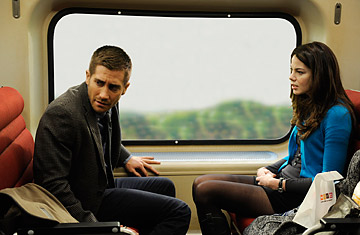
Jake Gyllenhall and Michelle Monaghan star in Source Code
The science-fiction thriller Source Code starts in a state of glorious disorientation. Jake Gyllenhaal wakes up on a train. His comely seatmate Christina (Michelle Monaghan) is chattering away, thanking him for some advice he's supposedly given her on a previous commute into Chicago. She's a complete stranger, and she's calling him Sean, but he's Captain Colter Stevens, a U.S. helicopter pilot who flies missions in Afghanistan, thank you very much. Eight minutes later the train blows up. Talk about a lousy morning.
Whereupon Colter's thoroughly traumatized consciousness returns to the familiar territory of a cockpit, where another woman (Vera Farmiga) he's never seen before appears on a monitor to brusquely tell him he's on a mission, and she is about hit the reset button and send his brain back to the train. Her name is Goodwin, and she's cool-eyed, distant and as crisp as her uniform. He's got an eight-minute window to locate the terrorist who blew up the train, and the military will keep sending him back until he delivers the intelligence they need.
Understandably, Colter, who never volunteered for this crazy Source Code Project, has some qualms. But neither Goodwin nor the creator of this technology, Dr. Rutledge (Jeffrey Wright) — his limp identifying him as a mad scientist, a cheap crutch (literally) to establish not character but stereotype — have any tolerance for Colter's questions or confusion. They treat him like a dementia patient they've lost patience with, and though his growing desire to save Christina et al. is perfectly natural, they are dismissive of his naive humanity. The point of this exercise is to find the bomber in time to save his next target (downtown Chicago) from a dirty bomb. The explosion is non-negotiable; the passengers, including the girl and the body he's visiting, are doomed. "Source code is not time travel, but rather, time reassignment," Dr. Rutledge growls.
Colter is at the mercy of technology and the government, and the movie is very eager to make sure we know this is a fearful condition. Colter's actual detective work isn't riveting (the bomber is easy to identify), but watching Colter's evolving reactions to his commuting companions is great fun, like Groundhog Day with bombs. In contrast to the chill of the cockpit, the train is warm and lively, filled with entertaining characters, including a stand-up comic (Russell Peters), a cocky college kid (Kyle Gatehouse) and a guy who is far too wired in for his own good (James A. Woods). Monaghan is charming, and we sense the growing connection between her and Sean/Colter. Gyllenhaal, whose youthful cuteness is now the slick handsomeness of a grownup movie star, clearly savors the wit in Ben Ripley's screenplay. On his fifth or so unpleasant encounter with the wired-in guy, Colter cuts him off with a quick quip: "Stay out of this tough guy, it doesn't end well for you." The role is all tension, but he's relaxed within it, and his pleasure is contagious.
Thus it is a tremendous downer when the second half of the movie shirks logic, defies its own established principles and raises more questions than it answers. Wright has a big, hammy expository scene explaining the theory of Source Code but neglects to explain vital parts of its practice, like how the military got access to Sean-the-sweet-history-teacher's memories in the first place. Maybe Rutledge's team picked through the wreckage looking for a not-quite-dead brain, pounced on it and rushed it to Dr. Rutledge in an ice chest? There would be no harm in clarifying, and the decision not to makes you wonder if the filmmakers themselves know the answer. Perhaps director Duncan Jones (whose Moon explored similar themes of twisted realities) just hoped we'd be so riveted by the urgency of Colter's quest that we wouldn't notice.
Certainly Jones has a talent for jazzing up the standard set pieces of an action movie. Each time the train blows up, you feel a little punch to the gut even though you know it's coming, and one version of the explosion, with Monaghan and Gyllenhaal on their knees facing each other, even achieves a sort of beauty — Monaghan's hand goes up as if in a pointless, sad effort to stop the flames rolling toward them. There are times when Source Code, with its distrust of technology and its sharp, cynical take on the soldier's servitude, feels like a Kubrickrian twist on Johnny Got His Gun. But you would have to be really smitten to ignore the liberties it takes with its own semi-logic in order to rebel against the machine. The ending must be intended for audience satisfaction, but it provides the exact opposite. We're disoriented all over again, this time far from gloriously.
